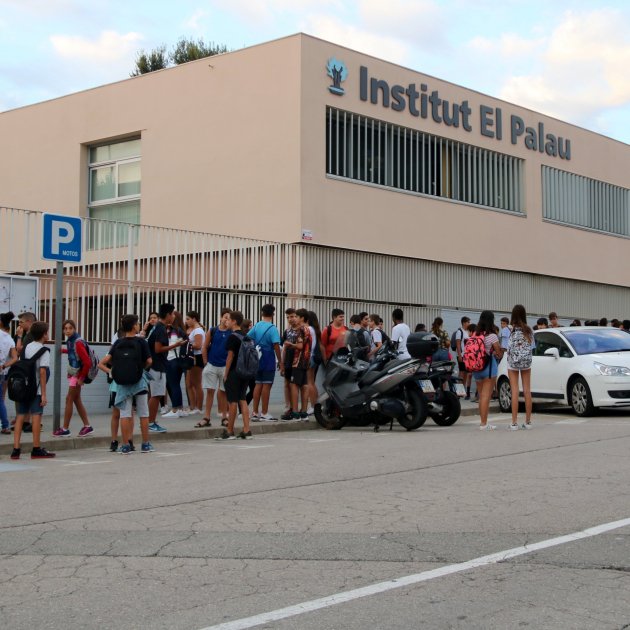The wound at IES El Palau from the 1st October referendum is not completely closed. A science teacher at this secondary school in the town of Sant Andreu de la Barca will probably be sent to trial for one phrase which she allegedly said to a 12-year-old student, the son of a Civil Guard officer, on the day after the Catalan independence referendum of 1st October, 2017. This is the decision of the Barcelona Audience, which in a ruling made by the Catalan High Court in December, but issued this Tuesday, has reopened the case against this teacher, after a judge in a Martorell court closed the case because he did not see any crime, on July 8th, 2019. In other words, almost four years have gone by since that earlier decision. "You must be happy with what your father did yesterday" is the sentence that the minor and his father say the teacher said to him in front of his classmates, an action that the Barcelona prosecutor responsible for hate crimes and discrimination, Miguel Ángel Aguilar, considers to be a hate crime and also one against moral integrity. The teacher has denied having said this phrase, but, for the Barcelona Audience, these claims must be clarified "in other phases", that is to say, at a trial.
In the resolution, a chamber of the Barcelona Audience - made up of judges Joan Ràfols, Daniel Almería as judge spokesperson, and Lucía Avilés - affirms that "it does not share the forcefulness expressed by the investigating judge" in closing the investigation against the teacher "If the expressions that the investigated teacher addressed to the student are true, according to the complaint, this was a clear excess. We believe that no one can doubt it", affirms the court. And it adds that this excess "does not only constitute an administrative offence", as the instructor maintains, but that "a criminal offence cannot be ruled out, as proposed by the prosecution". The complaint, originally against nine teachers led to a pile-on from unionist Spanish media and social media against the staff at the secondary school in Barcelona's metropolitan area, and about thirty teachers left their jobs at the school centre.
More than verbal excesses
The same chamber at the Barcelona Audience also confirmed the closure of all the other cases as ordered by the Martorell judge, relating to seven teachers who had been under investigation, making the exception of this case, which it reopened and moved forward to a likely trial. The court stated that in most of the cases, the teachers' statements in class could not be accused of being crimes, such as the case of the teacher who asked students who were the children of Civil Guard officers - in Sant Andreu de la Barca, close to the school, there is a barracks - to raise their hands and then told them that, if they wanted, they were excused from the protest being held in the schoolyard over the violent actions that the Spanish paramilitary force along with the Spanish National police officers had carried out against townspeople to prevent the vote on 1st October.
In the case of the remaining teacher, however, the court states the following: "It cannot be maintained that, prima facie, the integrity and moral dignity of a child under the age of 12 is not attacked when his teacher, in the delicate exercise of this professional position, with the consequent responsibility that must be demanded of him for the function he develops as a model and reference figure for his 25 students, minors of age, publicly and in the very serious and explosive socio-political context that went through the whole of Catalan society in those initial moments of October 2017, absolutely polarized, asked the son of a Civil Guard if he was happy with what his father had done the previous day, ordering him to respond in writing, with homework or teaching activity, beyond a spontaneous and punctual verbal excess", and "despite the fact that he said it in a normal tone, neither angry nor happy", as the investigating judge noted.
The ruling added that to meet this crime definition only a generic offence is required, not a subjective attack: "It is sufficient to establish a willful behavior that is seriously denigrating or humiliating in its predominantly objective consideration, if it already in itself amounts to an attack on the legal good of the dignity of the person". The court also does not accept that the socio-political context of the moment "could in some way justify the behaviour of the teacher".
Right to freedom of expression
The Martorell judge, in addition, situated the teacher's action in the context of freedom of expression and opinion, but the Barcelona Audience criticized this for "missing a more complex weighting" of the collision between fundamental rights and that, as expressed by the prosecutor, "freedom of expression cannot protect the right to denigrate and humiliate another person, and least of all in an asymmetrical relationship, between an adult teacher and a 12-year-old student, however defensible and legitimate, or not, whatever their political or social ideas are." The court also disputed the view that if the minor has no psychological consequences from the incident, the closing of the matter under investigation can be justified, since such consequences are not necessary in these crimes.
As a result of all this, the Barcelona Audience, while reiterating that it "does not prejudge" the case "or its criminal classification", does consider that "it cannot be definitively closed" and that "its objective seriousness, greater than in the rest of the teachers", merits the continuation of the judicial process and the opening of the intermediate phase, that is to say, to send the teacher to trial and for a court to decide whether her actions are criminal or not.
